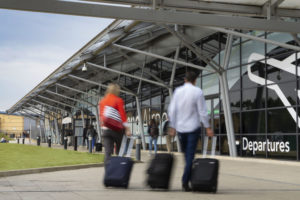 London Southend Airport is committed to minimising its impact on the environment, protecting air quality, and delivering social benefits to the community around it. As well as being the UK’s fastest growing airport in 2019, it was named ‘London’s Best Airport’ for the sixth consecutive year by consumer group Which? this year.
London Southend Airport is committed to minimising its impact on the environment, protecting air quality, and delivering social benefits to the community around it. As well as being the UK’s fastest growing airport in 2019, it was named ‘London’s Best Airport’ for the sixth consecutive year by consumer group Which? this year.
London Southend Airport recognises that air quality is important to everyone and that poor air quality can impact upon health. Having measured N02 levels since 2011, the airport has improved its surrounding air quality year on year. It is 20.00μg/m3 – 28.85μg/m3, compared to the 40 μg/m3 Government limit value.
The main source of energy at London Southend Airport is electricity. All incoming electricity is measured monthly through remote access meters, which it uses to monitor overall consumption. One of the main ways the Airport controls energy consumption is through its Building Management System. This allows London Southend Airport to carefully monitor and control energy consumption in all areas of the new terminal building and provides data on electricity kW/h and CO2 consumption as well as rainwater harvesting.
Almost 20% of the airport’s electricity comes from renewable sources. A £2 million solar farm at London Southend Airport was officially registered with OfGEM on 31 December 2015. OfGEM supports London Southend Airport’s objectives of reducing its carbon footprint and the electricity required from the national grid network. It connects to the airport’s electrical ring main, supplying approximately 18% of the airport’s annual electricity requirements with the capability for limited power being exported to the national grid.
The solar farm is an addition to the 496 solar panels previously installed on the roof of the airport’s new £10m terminal extension during 2014. These solar panels supply the terminal’s shops, cafés and restaurants with solar electricity via the airport’s private electricity network.
London Southend Airport recognises it has an important role to play in protecting the environment whilst creating economic benefits. It has sent zero waste to landfill since 2015, and in 2019 it reduced its CO2 emissions by 36% per unit revenue.
The Airport’s terminal has been awarded a BREEAM (Building Research Establishment Environmental Assessment Methodology) “Very Good” certification. This has been achieved through initiatives including air source heat pumps which absorb heat from the outside air and warm the interior of the building. The airport has also created a wildflower meadow to increase the biodiversity of the site, encourage insects such as bees and raise the overall ecological value of London Southend Airport’s footprint.
Alongside the wildflower meadow, a new children’s play area including £800k of state-of-the-art play equipment was constructed. Over the past seven years the new planting has become established, the wildlife has flourished, and many local children now enjoy a safer environment with a better equipped play area.
In its commitment to supporting the local community, London Southend Airport employs 78% of its workforce locally. To ensure a high percentage of jobs are accessible to local people, the airport actively looks to offer a significant amount of development and entry level as well as graduate opportunities where possible.
The airport sensitively manages noise to balance operational requirements with the needs of local communities, working to reduce the number of people impacted by noise and to contain any impact to an acceptable minimum.
In response to COVID-19, the airport worked round the clock to support the community’s key workers, from police to medical staff. The Holiday Inn at London Southend Airport provided accommodation to key workers that were unable to see their families or return home due to their exposure to the virus. The airport also delivered 75 care packages to NHS workers at Southend and Basildon hospitals, as well as the ambulance base on Aviation Way, who had been unable to get to a supermarket or find everyday items.
Kate Willard OBE, Thames Estuary Envoy, says: “London Southend Airport is a hugely important hub in the Thames Estuary for international travel. A forward-thinking airport and innovator in its sector, it has led many impressive initiatives working with the environment and community in which it is based. From its ongoing commitments to reducing noise and waste, to improving air quality, to its laudable use of resource in the face of COVID-19, London Southend Airport always has a best-in-class approach.”
To find out more visit southendairport.com
If you would like to nominate your organisation or one you know to become a Visionary please get in touch.
